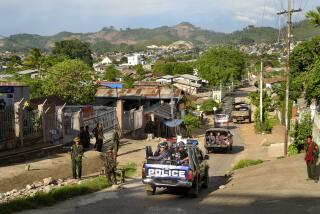Militia keeps U.S., Iraqi forces out of Sadr City
- Share via
BAGHDAD — Mahdi Army militiamen brandished Kalashnikovs and rocket-propelled-grenade launchers at checkpoints in the Sadr City neighborhood Wednesday, a sight harking back to the days after the U.S.-led invasion of Iraq when armed followers of radical Shiite cleric Muqtada Sadr regularly defended the streets.
This time, though, they are flexing their muscle against the Shiite-led Iraqi government, rather than providing protection against Sunni Muslim extremists.
The 2.5-million-resident Sadr City, long the bastion of the cleric’s religious movement, is virtually impenetrable by outsiders because of its winding streets and alleys. But since Tuesday, Sadr’s militia has fended off attempts by Iraqi and U.S. forces to enter the district at a time when Prime Minister Nouri Maliki’s security forces are also engaged in a major military crackdown in Basra, the largest city in southern Iraq.
Few cars drove in the streets of Sadr City on Wednesday, most shops were closed and children played soccer in the dirt lots along its commercial boulevards, with their posters of Sadr and his revered late father, Grand Ayatollah Mohammed Sadeq Sadr.
Sadr supporters torched offices of Maliki’s Islamic Dawa Party and those of the Supreme Islamic Iraqi Council on Tuesday. Now they express worry that their rivals will return, backed by the Americans’ firepower. Many remember the bloodshed when U.S. forces tried to suppress the Mahdi Army’s uprising in 2004 against the American occupation.
Some on Wednesday cursed the Supreme Islamic Iraqi Council’s militia, the Badr Organization. “Who kills the Iraqis? It is the Badris,” a man with gray hair wrote on a wall. The faint sounds of mortar rounds exploding and the dull rip of machine guns echoed in the background.
Abu Zahra, a Sadr supporter, bragged that the Iraqi army and police were abandoning their checkpoints at the edge of the neighborhood.
“They don’t want to participate in such confrontations,” he said.
Some residents, though, chafed at the Mahdi Army’s restrictions.
“Teenagers are forcing even the bakeries to close down! What will the people eat? Look at the city, it is completely paralyzed,” said 46-year-old Abu Firas.
As he spoke, a pickup truck with four black-clad fighters toting assault rifles cruised by. “They are ruling the city,” he said.
At the edge of Sadr City, Hassan Rubai inspected the remnants of his wholesale soda shop after it was caught in the crossfire between the Mahdi Army and American and Iraqi forces. Cans were charred and glass was scattered on the floor. Rubai swept up chunks of shrapnel.
“At 2:30 a.m., shooting started in the street where my shop and apartment are,” he said. “We gathered with our children in one room. They were shaking and we tried to keep them quiet. When the shooting was over, we sent the women and children to our neighbors’ houses. We didn’t sleep the rest of the night.”
More to Read
Sign up for Essential California
The most important California stories and recommendations in your inbox every morning.
You may occasionally receive promotional content from the Los Angeles Times.









